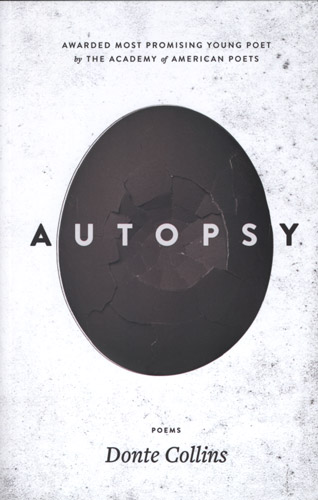Autopsy
i am alive by luck at this point, I wonder
often: if the gun that will unmake me
is yet made, what white birthwill bury me, how many bullets, like a
flock of blue jays, will come carry my black
to its final bed, which photo will be used“What The Dead Know By Heart”
i am alive by luck at this point, I wonder
often: if the gun that will unmake me
is yet made, what white birthwill bury me, how many bullets, like a
flock of blue jays, will come carry my black
to its final bed, which photo will be used“What The Dead Know By Heart”
My brother died the day Donte Collin’s collection Autopsy arrived in the mail. I gave it a glance and faced the reality of losing my only sibling. A month later, I read “Death Ain’t Nothing But a Song” and “Don’t Tell Your Uber Driver You Are Going to an Orgy,” and realized I was reading a manual for grieving. No one gets out alive. No ever returns, death is just a fact we all must eventually accept.
In “Grief: The Inconvenient Translator” Collins deciphers all the platitudes we employ and receive while grieving:
i love you : if you died it would affect me
i’m sorry for your loss : people die all the time
i love you : don’t kill yourself
my deepest condolences : if you died i would make a Facebook status
you’re in my thoughts and prayers : thank God it wasn’t me
i love you : we can’t afford another funeral
she didn’t suffer : don’t you know a wooden casket can take centuries to rot
The page lists all the words we hear and think while others attempt to help us accept death. The words the grieving receive will never fill the hole that remains. I’ve said them. You’ve said them. Collins has translated them with courage and honesty.
When I finished the 50-page book (too damned short!), I looked at his author’s photo. The bio, “Donte is a 21-year-old queer, black poet . . . ” winner of many prizes, etc. Donte’s life, from what I can infer, could not be more different than mine. Half my age, American, black, queer—our only common denominators are death and poetry. On YouTube, the kid reads off his phone: sacrilege! Yet, every time go back to read a page, I feel my heart strings knotting to another, another human soul out there in pain, going through the exact same thing I am right now. This is poetry at its best—spontaneous overflowing of emotion, connecting vital forces, giving solace through expression.
Although, young Collins has done his reading. There are sonnets, a thirteen-ways poem, rondos, sestinas, and free form jazz. The erasure poem “The Orphan Performs An Autopsy On The National Anthem” captures the national sentiment exactly:
you
proud. wefight
wered
bursting in
the night.our flag
the land.
Collins contains Whitmanesque transcendence, “you’re also the casket / you’re also the soggy grave parting its greedy / lips.” There is Ginsburg’s erotic urgent, “there is no equation / for correcting an unwanted erection.” There is Rimbaud’s youth, e.e. cummings’s punctuation, Jay-Z’s knife sharp one-liners, and a whole university of confession.
Button Poetry must also be praised for printing this essential writing. By printing, Autopsy, and collections by sam sax, Olivia Gatwood, Aaron Coleman, Danez Smith, and other young online flames, they are turning the performativity of spoken word into the next-generation of the American literary canon. By cementing these necessary recitals on the page, Button Poetry is opening doors and combating the ease of forgetfulness. A video can go viral, but a book can be given to a grandchild.
The Irish tradition of keening and keeners, hiring lamenters to sing and wail at funerals, has become extinct. But the need to wail at such moments will never die. Through Collin’s writing, a communal solace can be found through grief. Collins is keening for his mother, for America, for freedom, for love, for youth, for his lost compatriots who are being systematically shot, and for us. His wail exterminates anguish. With humor, irony, lust, magic, and craft, Donte Collin’s Autopsy is a healing tool that conducts hope. Encore.





